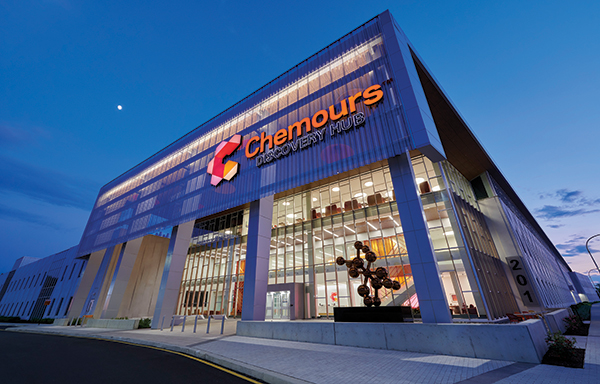Chemours, a global producer of titanium technologies, thermal and specialized solutions, and advanced performance materials, opened its Discovery Hub in March 2020 on the University of Delaware’s Science, Technology and Advanced Research (STAR) Campus in Newark. The 312,000-sq.-ft. facility meets several objectives, chief of which is consolidating more than 300 of the company’s researchers and scientists in one location to facilitate collaboration among business units and projects.
“Another,” says Site Manager Brian Coll, “is that we saw the R&D arm of Chemours becoming more important as we think about our future as a corporation. Innovation requires people to collaborate not just internally, but externally too. It’s about engaging with our customers and showing them what we’re working on.”

The STAR Campus provides a premier location and capability for us to practice science that will benefit society in the future.”
— Brian Coll, Site Manager, Chemours Discovery Hub
Third, says Coll, is the Discovery Hub’s location on the STAR Campus and being part of a larger technical community with access to resources, equipment and people. “Not just for Chemours and the University of Delaware, but hopefully for those who come to the campus in the future,” he relates.
The Mid-Atlantic’s Research Magnet
The STAR Campus, a designated Opportunity Zone, sits on a 272-acre property on the Interstate 95 corridor with easy access to rail transportation to New York, Washington, D.C., and other metros. Besides Chemours, private-sector STAR residents include SevOne, a performance computing company; Independence Prosthetics-Orthotics; Bloom Energy, which makes clean fuel-cell power sources; and Predictive Analytics. The Delaware Technology Institute and the Delaware Technology Park also are located on the Campus as are the University of Delaware Biomedical Engineering department and College of Health Sciences.
The National Institute for Innovation in Manufacturing Biopharmaceuticals (NIIMBL) is another STAR Campus resident. NIIMBL is a public-private consortium of 120 partners working to accelerate biopharmaceutical innovation, support the development of standards that enable more efficient and rapid manufacturing capabilities, and educate and train a world-leading biopharmaceutical manufacturing workforce. The Institute is funded through a $70 million cooperative agreement with the National Institute of Standards and Technology (NIST) in the U.S. Department of Commerce and leverages additional commitments from its partners.
In December, NIIMBL announced 32 coronavirus response projects that will help the nation prevent, prepare for and respond to coronavirus public health threats. Six of the projects establish research and development testbeds that will support collaborative research and innovation at the NIIMBL headquarters.
“To move past the current pandemic and prevent and prepare for future public health threats, we must continue to create the technology, infrastructure, and skills that are needed,” said Biotechnology Institute Director Kelvin Lee, announcing the projects. “This diverse group of technology and workforce development projects addresses multiple public health response capabilities and strengthens the United States’ role as a global leader in biopharmaceutical manufacturing.”
Everyone Benefits
The addition of Chemours to the STAR Campus further elevates the University of Delaware’s stature as a hub for innovation in science, engineering and research. But benefits run both ways. The university supplies Chemours and other local employers with potential employees, interns, work co-operative opportunities and project collaborators among other resources.
“This is a key addition to the research ecosystem centered here on the university campus,” says Tracy Shickel, Director of Economic Development for the University of Delaware. “It greatly increases opportunities for collaboration with private industry and helps create workforce opportunities for a key industry stakeholder in the region. Investment like this on the STAR Campus benefits all involved — the university, the private sector and the broader research community in the region.”
“The STAR Campus provides a premier location and capability for us to practice science that will benefit society in the future,” says Coll. “A lot of the work we are doing at the Discovery Hub is around societal needs, whether it’s our investments in the hydrogen economy to decarbonize the electrical grid with our work in water electrolysis and fuel cells, or low to ultra-low global warming potential refrigerants. Much of the research we are doing, including with the University of Delaware, involves lithium ion batteries and how to make electric vehicle batteries last longer and charge faster, for example. The Discovery Hub was uniquely designed for cutting edge science and engagement with our customer base and the industry. Being here at STAR gives us access to the university’s staff and students and equipment. Those joint research projects highlight the benefit of public-private partnerships.”
This Investment Profile was prepared under the auspices of the Delaware Prosperity Partnership. For more information, visit choosedelaware.com or call (302) 244-5785.

